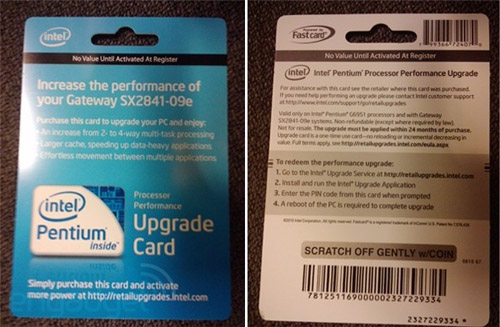Intel Testing Retail Upgrade Program for CPUs, Charging $50 to Improve Performance

You can upgrade your Windows 7 with a simple download so why not your processor too? This weekend, Intel and Best Buy started selling $50 upgrade cards for its new Pentium G6951 processor, which right now sits only in the low-end Gateway SX2841-09e desktop. After purchasing your $50 upgrade card and entering the associated activation code at retailupgrades.intel.com, you can download software that unlocks a full 1MB of L3 cache and enables HyberThreading support, both of which should improve performance significantly.
Intel is just testing this new program with the low-end Pentium G6951 right now, but if the program proves successful, we could see unlockable CPUs in a wide variety of systems. Perhaps one day, you'll even be able to buy a notebook with Core i3 in it and then later pay extra to upgrade to Core i5 or Core i7.
The concept of a manufacturer "binning" or locking certain features of their CPUs at manufacturing time is almost as old as the processor business itself. Intel and AMD may produce an entire series of CPUs with the same architecture but, at the end of production, artificially cap the frequency or limit the cache of some so they can be sold at lower prices. For example, a 2-GHz Core i5 CPU and a 2.5-GHz Core i5 CPU may have both started out in the factory as Core i5 CPUs. Through overclocking, users can often unlock that additional performance.
However, as you might expect, Intel's retail upgrade test has proved controversial with some critics. For example, Windows IT Pro's Paul Thurrott writes:
My advice to Intel is simple: Don't do it. Selling chips that are artificially limited is beneath the company. And while it'd be nice if Intel's product line supported a simple way to upgrade functionality over time, providing all the functionality upfront but not making it available to customers is not the solution.
ZDNet's Adrian Kingsley-Hughes writes:
It makes Intel look cheap. Remember, the features are already packed into all the CPUs, it doesn’t matter if they are switched on or not. The cost of adding these features is obviously insignificant, but Intel is still willing to charge people $50 to switch the feature on.
Stay in the know with Laptop Mag
Get our in-depth reviews, helpful tips, great deals, and the biggest news stories delivered to your inbox.
Ultimately, consumers will decide whether the Intel Retail Upgrade program becomes the norm or just a footnote in computer history.

